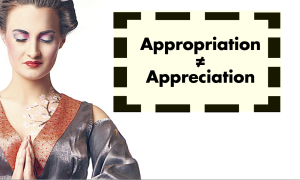When I was 4 years old, I was a nursery school and I went to this nursery school that had this big backyard with lots of toys to play on. But there was one toy that everybody wanted in particular which is tricycle and allows you to go really, really fast, and there’s one little boy who had control over this tricycle and in order to get turn you over ask him.
So one day, I actually got up the courage and I ask him to turn on, on this tricycle, and he said to me not yes or no or anything like that. He just said “YOU’RE FAT!”
And I cried, because I knew even then that being called fat and being fat was one of the worst things that you could possibly be. So I went home that day and I talk to my mom and I told her what it happened, and she said to me, “Well maybe we can go on a diet.” and then maybe kids won’t make fun of you for being fat. And she said this out of love and being a loving, caring mom and being someone who had live through the same kind of thing who had being called fat her whole life and had used weight loss techniques to try to mitigate that.
And it sound like a great idea to me, I would go on this diet and It seems like grown up things to do, my mom is always on a diet, her friends is always on a diet, and maybe I get out of this social stigma being fat.
And I would love to tell you that I’ve went on this diet, I loss all the weights and never had a diet again. But my dieting story is a lot like nearly everybody’s dieting story, it starts with one diet, you lose some weight, you gain it back, and you go on the other one, and the other one, and the other one. And over the next 24 years, I was always on a diet. I did diets that was prescribed by a pediatrician, nutritionist, I was on shakes, I was on diet pills, I was on diet pills that gave me the shakes, I was on every diet that you could possibly name. And in a lot of ways I was achieving at the same time. I always had this dream to go to the NYU on a whole scholarship and I got it, and I graduated a Summa Cum Laude. I went to law school, I sort of practicing law for number of years at prestigious New York City Law Firms, I had friends, I had boyfriends.
I was achieving in a lot of ways but on the inside, I felt like a failure, because I was consumed with how much I ate, how much I didn’t eat, how much I exercise, how much I didn’t exercise, what I wait yesterday, what I’m gonna wait tomorrow.
And I had I would now call Scale Dependence Self- Esteem and here’s a little bit of Scale Dependence Self-Esteem looks like.So just imagine I was scale right here, step on a scale, you look down and the number is going down and suddenly you feel like you’re on top of the world. And you walk to work, you feeling good and you get to your office everyone’s complementing you and you’re asking “What’s your secret?” and you’re like my secret is an awesome diet and everyone tells you how great you look .
And there’s just little tinge of anxiety, I have to admit there’s just a little tinge of anxiety because this is probably diet no. 15 and you know diet once were 14 started out this way and to the different way. And so there is thing that you believe you have this sort of lottery thinking, you think that, this is the One. This is the answer to my weight loss dreams.
Here’s the flip side of Scale Dependence Self- Esteem. Let’s go back to the scale, step on a scale , you look down and the number on a scale is up, and suddenly things don’t feels as great, and you feel ashamed , you feel like you failed, you walk to work, feeling down, worrying about what people will gonna say when you get into the office and usually they don’t say anything but you’re not getting those compliments, you’re not getting that approval anymore and to your self-esteem is affected negatively and here’s the danger of this Scale Dependence Self-Esteem.
This is a huge danger if you think about it millions of millions of people around diets at any given moment. This year alone Americans are gonna spends $62 billion on diets, and diet products, so there are millions of million people going through this every day. And I think that this is the problem, and I want to talk about this big mess about fat and health which is fat is unhealthy and weight loss is healthy.
Let’s talk about weight loss for just a moment, let’s talk about the reality of weight loss so here is the statistics that I think gonna blow your minds. 95% of people, who lose weight on a diet, gain it back within 3 – 5 years. 95% of people, right? This is a huge number of people who gain all of the weight back within 3 – 5 years, and you know what? 83% of people came back more weight than they lost.
So if you’ve ever been in both loosing 10 lbs. whose gaining 15, loosing 30, gaining 60, you’re not weird! You didn’t even fail. You are totally normal! You’re absolutely and totally normal. It’s a totally normal physiological response. You might think well I may be enough 5 % right? That may be I enough 5% that keeps some way of, generally speaking the majority of that 5% is keeping of 4-5-6 lbs. not a lot of weight.
And of course there’s others that way there are all those people who you know loose a bunch of weights and keep it of pass 5 years. But they are outliers. They are not the norm and they are not what anybody should base their own experience on, their expectations on.
If weight loss doesn’t work, it doesn’t work and just leads to the cycle of dieting that everyone’s calls yo-yo dieting. And people sort of understand that yo-yo dieting is a bad thing, but really all dieting is a yo-yo dieting. It really is because it doesn’t works so you go on the other diet, and another diet, and another diet.
So if dieting doesn’t work well you probably you’re thinking I’m hearing about bad things about obesity right? In fact, it’s so bad to be fat, we hear about the obesity epidemic all the time and the dangers of fat.
Well I’m here to tell you that fat is not dangerous the way you think it is. There’s an instances in a medical literature in research that talk about Obesity Paradox, so what is Obesity Paradox? It’s an instance that happens again, and again and again where obesity seems to have a protective of fact. Here are couple of examples where obesity or fat, (I like to use that word just Fat) has to protective of fat.
One is Type 2 Diabetes. People with type 2 Diabetes who are fatter actually have the longer life expectancy than thinner people with Type 2 Diabetes. And why do we tell people with the Type 2 Diabetes all the time we have to lose weight. We have to watch your sugar, and your carbs and you should have rest reduction but you have to lose weight, well! we’re giving people wrong information all the time. It shows up again and again.
It shows up with strokes. People who are fatter who have strokes tends to heal better after strokes and had better post stroke outcomes. People who ends up in post-surgical ICU, they have a better chance of surviving in thriving after a post-surgical ICU if they are fatter. And there’s certain types of cancers where this shows up.
And I wanna be clear, I am not suggesting that thin people try to get fat for their health. But I think that the point is that maybe fat and thin don’t matter as quite as much. Maybe they really don’t matter as much as we think they do.
Here is a chart from a study that was published in the American Board of Family Medicine, and why do we need to pay attention to Area no. 4, where all the bars are kinda the same. In this group, this is showing normally people by BMI, overweight people by BMI, and obese people by BMI. And what they found in this study this is a long term large sample study where they look at nearly 12,000 people over an average of 14 years, so this is a big study, and this is not a kind of thing you know where they look at 50 people for 3 months, this is a long term large sample study.
And what they found is that people who engage with 4 basic healthy habits have about the same life expectancy no matter what their size. So you take a 5.5 ft., 40-year old, a 135 lbs. woman and you take a 5.5 ft., 40-year old, 300 lbs. woman and they have the same mortality risk as long as they engage with this 4 basic healthy behaviors which are very simple. These are not complicated things.
These are kind of things like people do all the time and I’ll tell you what they are one is not smoking, second is moderate drinking or not drinking at all, third is eating fresh fruits and vegetables a day and fourth is getting moderate exercise like 30 minutes of walking a couple of times a week. And if you do those 4 basic healthy behaviors, weight really doesn’t really matter. It doesn’t correlate to anything. You have the same life expectancy no matter what your size.
So what is this mean? If healthy behaviors are what matters, if weight really doesn’t matter and if dieting doesn’t work, what the heck are we supposed to do? How do we step into a new paradigm where we’re not so focused on weight as an indicator of health? What we’re thinking about looking at healthy outcome what we’re thinking about looking at a people as a whole and thinking at a healthy behavior instead.
Well there is a new paradigm pretty new called “Health At Every Size” and in my work as a longest coach I used a Health At Every Size model. And here are the three principles of Health At Every Size, which are really basic.
One is eating in a way that’s in a line with your hunger and fuller signals and eating with pleasure, eating a variety of food. Two is finding body movement that is appropriate for your body and also pleasurable, stuff you like to do like moving in and enjoying. And third and perhaps my favorite is accepting your body understanding that there is a beautiful diversity of bodies in the world and your body fits right in there and its perfect and fine.
Engaging with these three principles has been shown to have better health outcomes than a diet. People overall they have more consistent self – esteem, they feel better, they continue to work out and exercise because they’re actually having fun. So this is a great paradigm and it’s really, really been catching on.
And this last part of accepting your body, accepting your body just it is me this one of the greatest peace movements of our time. Because if you can like owe of the judgments around your body and other peoples body, if you can stop denigrating your own body, saying negative things about yourself, it creates an amazing sort of peace.
So in preparation for my talk I ask some of my clients, and Twitter followers, and Facebook fans, if they would send me pictures of themselves with signs of they embrace body love, why loving their body important to them. And I received over 70 pictures from all over the world with people saying why this is important to them (I just share you a couple today) .
But I wanna ask if I may, I wanna ask you to try to engage to this process with me a little bit and what I like you to do today is just have the intention, just have the intention of loving your body. You don’t have to figure what that means. You don’t have to figure out how that’s gonna work, just have the intention because what happened when you do that as you create a beautiful ripple of fact.
You create an invitation for others around you to love their bodies select all judgments to let go of all the messaging we hear all day long about why our bodies are wrong and bad and need to change. And it creates a sense of peace and it creates a beautiful feeling.
So I just want you to have that intention today of loving your body and embracing body love. Thank you!
Want to discuss this further? Login to our online forum and start a post! If you’re not already registered as a forum user, please register first here.
Golda Poretsky is a Contributing Writer for Everyday Feminism. She’s a certified holistic health counselor and founder of Body Love Wellness, a program designed for plus-sized women who are fed up with dieting and want support to stop obsessing about food and weight. To learn more about Golda and her work, go to www.bodylovewellness.com. Follow her on Twitter at @bodylovewellnes.
Search our 3000+ articles!
Read our articles about:
Our online racial justice training
Used by hundreds of universities, non-profits, and businesses.
Click to learn more




















